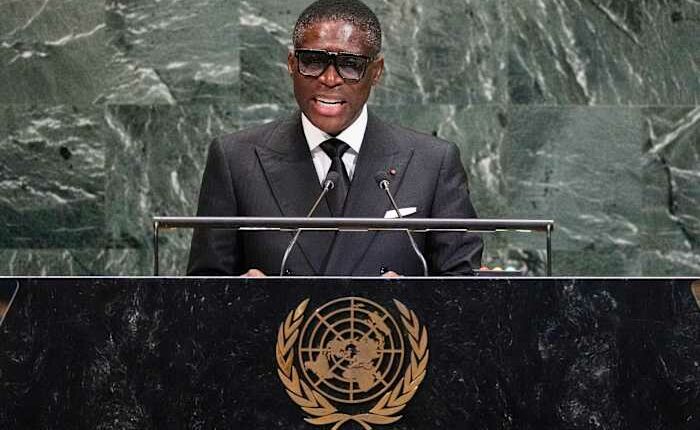Share this @internewscast.com

WASHINGTON – The U.S. Deputy Secretary of State, Christopher Landau, recently held discussions in Washington with the frequently prosecuted vice president of Equatorial Guinea. This meeting took place after the Trump administration granted a waiver from corruption sanctions, which enabled the West African leader to visit New York for last week’s significant U.N. gathering, as well as other cities in the United States.
The State Department announced on Tuesday that Landau and Teodoro “Teddy” Nguema Obiang convened a day prior to “reaffirm joint commitments to enhance commercial and economic relations, combat unlawful immigration, and bolster security partnerships.”
“Both leaders agreed to take concrete steps to expand the bilateral relationship moving forward,” the department said in a statement.
Despite allegations against Obiang for siphoning his country’s assets to fund his extravagant lifestyle of luxury cars, estates, and superyachts, he was recently granted a temporary exemption from U.S. sanctions that had previously prohibited his travel to the U.S.
The waiver, reported by The Associated Press earlier this September, was granted following suggestions that it’s in America’s national interest to counter growing Chinese influence in Equatorial Guinea and promote U.S. oil and gas ventures there, as per administration officials who wished to remain anonymous while discussing private strategic considerations.
This waiver permitted Obiang — who stands out globally among leaders facing corruption allegations for his indulgent lifestyle, which has drawn legal scrutiny in many nations — to visit various U.S. cities beyond New York, including Washington, Miami, and Los Angeles. He owns properties and luxury cars in these cities, some of which he has forfeited through legal settlements.
As the Trump administration eases regulations for an often-charged African leader, it has simultaneously tightened visa requirements for numerous international individuals, both revoking and denying access to those deemed undesirable in the United States.
That included denying visas to Palestinian Authority leaders to come to the U.N. General Assembly meeting and restrictions on delegations from Iran, Brazil Sudan, Nicaragua and Venezuela.
Iranian diplomats were barred from shopping at wholesale discount club stores like Costco and prohibited from buying a slew of products deemed luxury goods without permission from the State Department. Those restrictions were announced just before the General Assembly was set to start after the proposal was first reported by the AP.
Under restrictions not publicized until Tuesday after the close of the assembly’s gathering of world leaders, Brazilian Health Minister Alexandre Padilha and his family were blocked from traveling beyond five blocks of their New York lodgings, U.N. headquarters and the Brazilian mission to the U.N. without permission from the State Department.
President Donald Trump has been in a long-running feud with Brazilian President Luiz Inácio Lula da Silva over the country’s prosecution of Lula’s predecessor, Jair Bolsonaro. The Trump administration has slapped sanctions on judges and others and imposed 50% tariffs on many of Brazil’s exports to the United States. Trump and Lula met briefly last week at the U.N. and agreed to meet in the near future, but no date has been set.
Venezuelan Cabinet minister Magaly Gutierrez Vina was subject to similar restrictions, requiring her to get permission for any travel beyond a 1-mile radius of her lodgings, U.N. headquarters or the Venezuelan mission to the United Nations, according to documents posted to the Federal Register website.
Nicaraguan Foreign Minister Valdrack Whitaker and his delegation were required to get approval for any travel beyond a 25-mile radius of Columbus Circle during the General Assembly, the documents said.
The same restriction was put on Sudanese military leader Abdel Fattah al-Burhan and his government delegation, although Burhan opted not to attend the General Assembly.
Copyright 2025 The Associated Press. All rights reserved. This material may not be published, broadcast, rewritten or redistributed without permission.











